ICTs and Education
The focus of IT for Change’s work in education continues to be on demonstrating and maturing models of technology integration that strengthen teacher agency and school autonomy in public education systems. In 2018-19, we continued to work on making classroom processes more democratic and participatory, towards building teacher networks and collaborative resource repositories. We also made efforts through our work to inform education policy and discourse.
Overview
The promise of digital technologies has been the empowerment of the peripheries. In the context of education, this would mean empowering teachers. Using ICT freely for enhancing content and pedagogical knowledge, creating and sharing open educational resources, and supporting constructive classroom engagement would support teacher professional development and strengthen teacher agency. ICT can support local collaborations among teachers and bring them together to engage on theory and practice. A free and open learning environment also requires the use of free and open digital technologies.
However, the default trajectories of ICT in education has not been in this direction. There is huge pressure from those who see ‘Ed-tech’ as a big business, to make schools, teachers and students consumers of their products through provisioning of proprietary applications, content and models. For many bureaucrats, ‘making the teacher work’ is the solution to quality education, with digital technologies being seen as potent tools for supplying content and monitoring performance.
Many of the ICT projects see the tablet as the default ICT device for teachers and students, along with pre-packaged content. CCTVs in classrooms, on-line data collection directly from schools to state and national databases for monitoring of teacher and students is becoming more common. The role of local institutions is limited to the collection of data, but its use for supporting local decision-making and community participation is not a part of the design. The use of ICT thus increases centralization of authority and power and further dis-empowers schools and teachers. A second danger of data collection is the emergence of big data models, which use algorithms for supporting personalized learning. This process further hollows out the role of the school and the teacher and, as discussed in our paper, Making AI Work for Education, threatens to move us further away from the promise of education as a tool for social transformation.
The recently released draft National Education Policy includes progressive language focusing on teacher empowerment. It stresses the need for public ownership of technologies, and alerts that digital technologies as disruptive technologies can have beneficial and harmful implications.
At IT for Change, we have always taken a critical perspective that there is usually a trade-off in the use of digital technologies. This needs to be thought through carefully before piloting programs. Further, learnings from pilots need to be analyzed and carefully understood before scaling programs across larger geographies. The basis for analyses always has to be the educational aim that we are trying to move towards, or the educational challenges that we are seeking to address with the technology. Our work this year has continued to rest on this cornerstone principle.
Teacher professional development – Subject Teacher Forum
The IT for Change team designed and conducted a training for Mathematics teachers to develop them as State Resource Persons (SRPs) as part of the Samagra Shiksha Abhiyaan (SMSA) teacher training program of the Government of Rajasthan. These 60 SRPs conducted a similar program for over 500 teachers across 13 districts. IT for Change conducted these trainings using the Hindi (Devanagari) interfaces for Geogebra and Free Plane software tools respectively. IT for Change had earlier contributed to developing these interfaces.
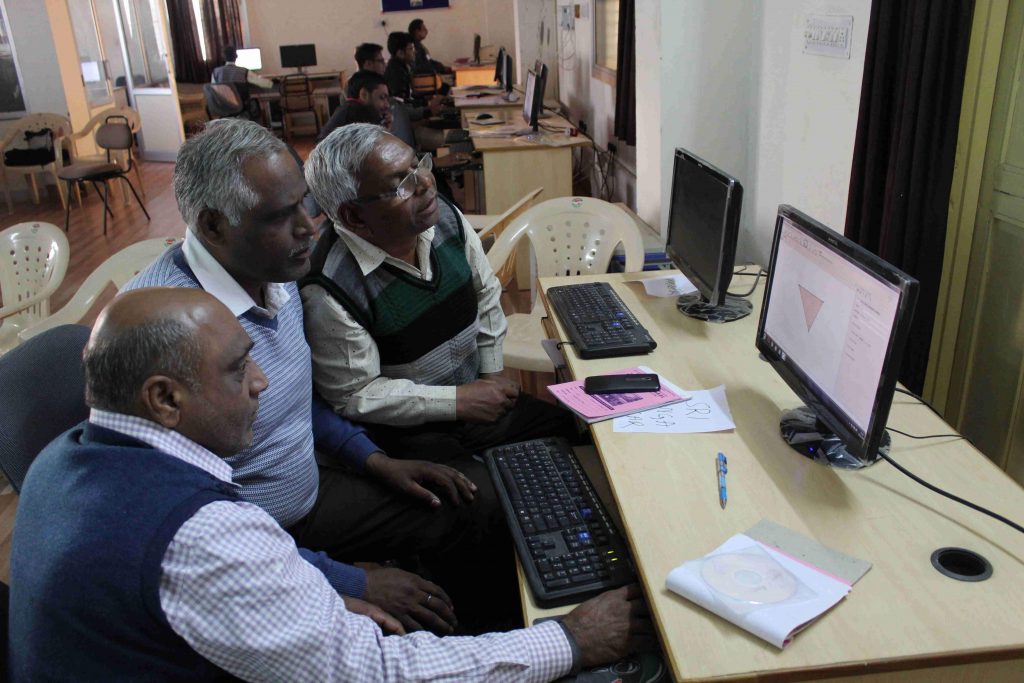
Telangana Subject Teacher Forum
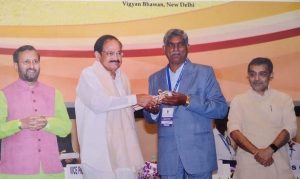
In Telangana, IT for Change designed and conducted a workshop to train resource persons for the State Technology Support Group, to provide technical support to teachers in schools. The aim of the program is to build institutional sustainability in ICT use. Ramesh Bandari, one of the Mathematics resource persons in this program received the National ICT Award for 2018-19 from the Ministry of Human Resource Development for his efforts.
Trainings and workshops
Over the year, the IT for Change team has designed, organized and conducted several workshops for the education community, including for students, student teachers, teachers and administrators. These included sessions aimed at:
- M.Ed. students of Bengaluru University, on using FOSS spreadsheet application (LibreOffice Calc) for data collation, analyses and visualization.
- Head Masters of 100 schools, on digital tools and methods for classroom teaching, at the invitation of Kristu Jayanti college.
- College teachers across the country, on concept mapping and video resource editing at Ramanujam College, Delhi University.
OER development in Indian languages
Open Educational Resources (OER) are seen by educationists as an important part of providing high quality and inexpensive curricular resources to students and teachers. Unfortunately, most OER is in the English language. IT for Change’s approach has been to integrate the development of OER in Indian languages as an integral component of its teacher development programs.
During the year, we worked with teachers to develop OER in Kannada and in Hindi. Geogebra resources were translated to Hindi and published on the Teacher Network Open Educational Resources (TOER) repository maintained by IT for Change. We also worked with student teachers of Vijaya Teachers College to contribute content to Kannada Wikipedia.
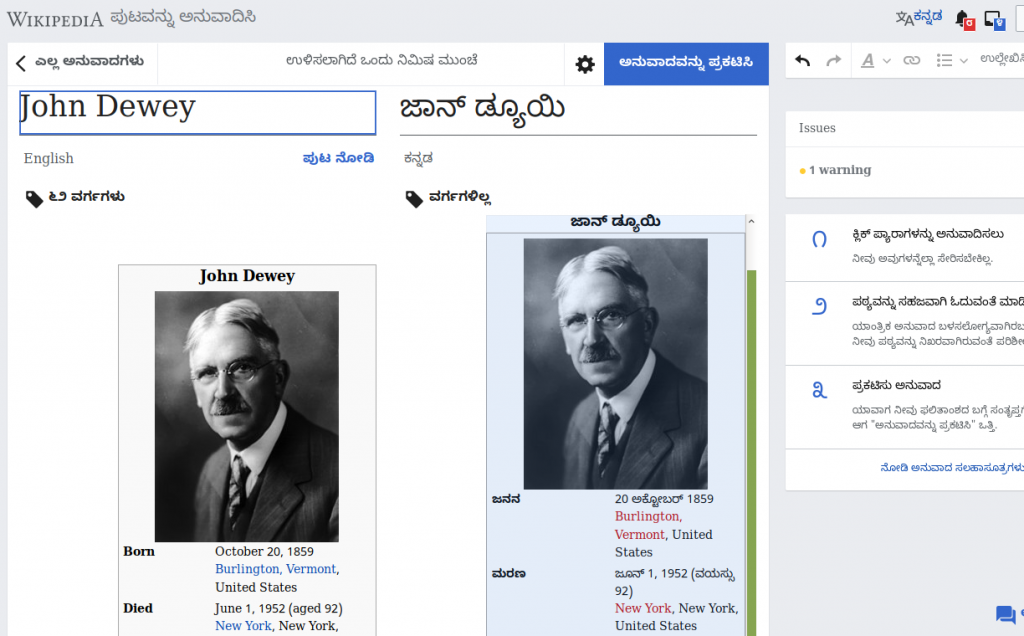
Blended learning programs
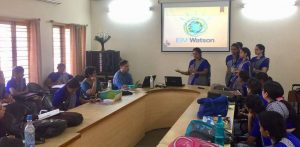
In April 2018, IT for Change entered into a Memorandum of Understanding (MoU) with Vijaya Teachers College, a reputed institution in the area of teacher education, for offering pre-service programs for student teachers and teacher educators. IT for Change designed and conducted sessions for student teachers from the B.Ed program, to help them learn a range of digital tools and develop OER in their domain areas. The course was offered in a blended mode, using the Moodle Learning Management System (LMS), thus allowing students to complement learning in the classroom with self and peer learning online.
IT for Change also entered into an MoU with the Regional Institute of English, South India (RIESI), in September 2018, to offer e-learning and blended learning courses. With IT for Change’s support, RIESI launched its first LMS-integrated course offering for its Post Graduate Diploma in English Language Teaching (PGDELT) program. The PGDELT program is a distance learning offering for which, RIESI faculty converted part of their course content into digital format and made it available on the LMS to support continuous learning.
Gurumurthy Kasinathan was invited by Tata Institute of Social Sciences to design and transact the Education Leadership and Management (ELM) course, offered as a part of their Masters in Education program. The course was offered to a mixed cohort of teachers and teacher educators from Afghanistan and India through a blended mode, using a custom version of the popular edX MOOC platform, developed by Massachusetts Institute of Technology and Harvard University.
Teachers Communities of Learning (TCOL)
Apart from teacher development programs, we continued to engage with teachers on integrating ICT into their practice through the Teachers Communities of Learning program (TCOL) in South Bengaluru. The aim has been to strengthen participatory learning and use of rich and contextualized teaching content to improve student engagement and learning.
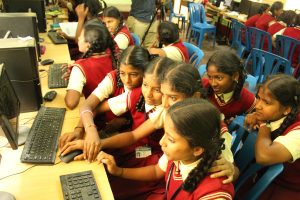
In 2018-19, the program was extended to government aided schools in the block. Teacher support was done in two ways – first through periodic interventions where teachers and IT for Change collaborated to develop lesson plans, activities and resources in Mathematics, Kannada and Digital Literacy. The second was through block level teacher capacity building workshops, where participants learnt to use digital tools for subject teaching and developing content. Such workshops were held for Mathematics and Kannada teachers and for Head Teachers.
In November 2018, IT for Change also began a collaboration with the Foundation for Education, Ecology and Livelihood (FEEL) that works on tribal education and rural development in predominantly tribal areas in the Chittoor District of Andhra Pradesh. The two organizations worked towards supporting digital integration in the tribal schools FEEL runs and strengthening the education and digital capabilities of tribal communities in the region. As part of this, community resource centres were set up in tribal schools in two villages and regular community interactions were held to introduce basic literacy and numeracy as well as craft skills to members.
Papers and presentations
- In September 2018, Gurumurthy Kasinathan wrote Policy and Practice in Technology based Education, based on his presentation at the Connected Learning Initiative symposium and Exploring Teacher Agency – ICT Program Design in School Education for the Voices of Teachers and Teacher Educators journal of National Council of Educational Research and Training (NCERT).
- In November 2018, Yogesh K.S. presented work on IT for Change’s contributions to localization of Moodle in the National MoodleMoot India 2018, held at the University of Hyderabad. Yogesh K.S. also helped the OpenStreetMap India community to organize State of the Map 2018 Asian edition conference in Bengaluru.
- In December 2018, Anand and Gurumurthy Kasinathan presented a paper on Technology and English Language Teaching in the national conference-cum-workshop organized by RIESI, Bengaluru and the English Language Teachers’ Interaction Forum. Gurumurthy Kasinathan also spoke on Education in the Age of Technology at the Nava Keralam Karma Padathi Education Festival, organized by the Kerala School Teachers Association.
- In March 2019, Yogesh K.S. presented a paper on AI and Education at the National Seminar on Innovative Practices and Research in the era of Digi-Education, organized by Department of Education and Education Technology, University of Hyderabad.
Impact
In the year 2018-19, our work through trainings and other techno-pedagogic interventions reached more than 1,000 high school teachers and 50 Head Masters across Karnataka, Rajasthan and Telangana. Our work also informed national curriculum efforts. Gurumurthy Kasinathan from IT for Change was invited by NCERT to be part of a committee to review the Class 9 ICT textbook, at a workshop in Delhi in June 2018. The text book aims to build basic digital literacy in students using free and open source software. Not only did our work focus on building digital capabilities but also enhancing and expanding critical thought among student teachers, teachers and teacher educators. Through our collaboration with Vijaya Teachers College, we helped student teachers explore cutting edge issues in the digital society such as Artificial Intelligence and fake news. Our unit on ICT and Society exposed students to the larger impact of ICT on society with an aim to introduce the complexities and challenges of ICT integration on education and society.
Plans for 2019-20
In the coming year, we will continue our work in Rajasthan to deepen and strengthen the Subject Teacher Forums and OER repositories. We will also engage with state governments interested in a program for teacher development through ICT integration and further our collaboration with Vijaya Teachers College and RIESI on integrating ICT in teacher education programs. We will also continue to deepen our school level demonstration project with government and aided high schools in Bengaluru South district.
As part of its future mandate, IT for Change will work with government and aided schools in Bengaluru and Mysuru, to design and implement a program for adolescent girl empowerment from 2019-20 through 2023. This initiative, supported by the British Asian Trust kicks off in April 2019.
